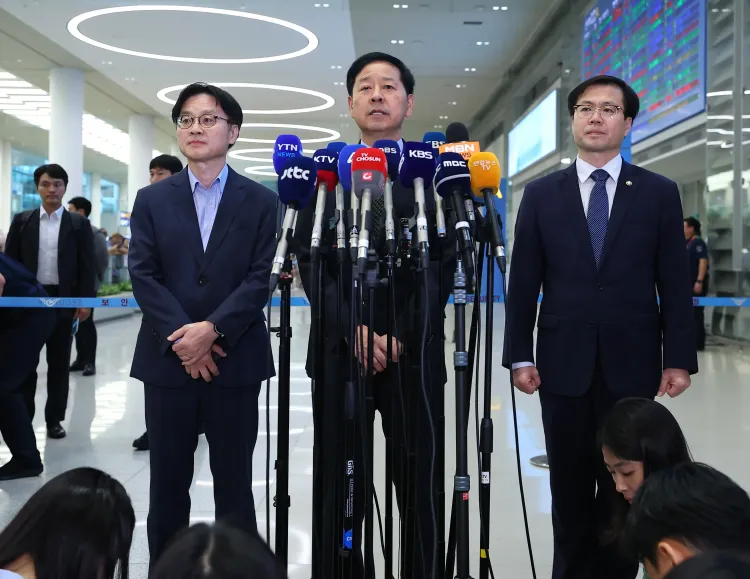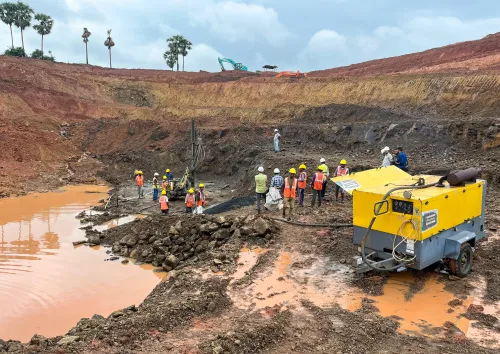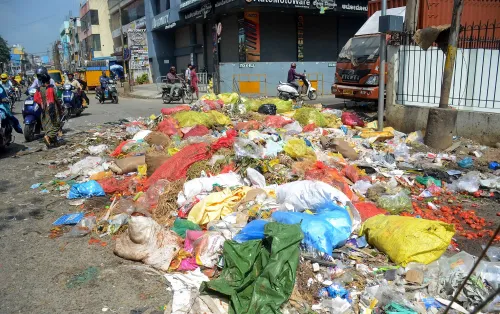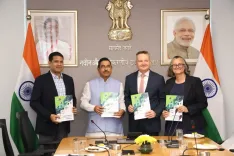Are South Korea and the US Advancing in Trade Discussions?

Synopsis
Key Takeaways
- South Korea and the U.S. are making significant progress in trade talks.
- Seoul is committed to a $350 billion investment in the U.S.
- Key negotiations focus on finalizing the trade deal.
- A potential summit between leaders may enhance negotiations.
- Concerns exist over direct investment risks.
Washington, Oct 16 (NationPress) South Korea and the United States are achieving significant advancements in their trade discussions, as stated by Seoul's trade minister. They are working to finalize the specifics surrounding the implementation of Seoul's $350 billion investment commitment, part of a bilateral trade agreement established in July.
Trade Minister Yeo Han-koo made these comments upon landing at an airport near Washington. He is joined by Presidential Chief of Staff for Policy Kim Yong-bum, Finance Minister Koo Yun-cheol, and Industry Minister Kim Jung-kwan for a weeklong effort to accelerate negotiations with the US, according to the Yonhap news agency.
"Progress is underway," Yeo told reporters at Ronald Reagan Washington National Airport. "A positive atmosphere has been created, encouraging top officials from Seoul to visit Washington and give their best effort."
Yeo emphasized the need to achieve a result that "best serves national interests," referencing comments from U.S. Treasury Secretary Scott Bessent, who anticipates an outcome from the discussions within "the next 10 days."
"We are concentrating on the content and substance rather than being fixated on an artificial deadline," the minister remarked.
He expressed optimism that a possible summit between South Korean President Lee Jae Myung and U.S. President Donald Trump, coinciding with the upcoming Asia-Pacific Economic Cooperation summit in Korea later this month, could present a valuable opportunity to finalize the trade agreement.
"We are striving to make the most of that chance," he stated.
The two nations reached a framework trade deal in late July, which includes Seoul's commitment to invest $350 billion in the U.S., among other agreements, in exchange for Washington's promise to reduce its "reciprocal" tariffs and sector-specific duties on South Korean automobiles from 25 percent to 15 percent.
However, the deal has yet to be enacted as negotiations continue to address several contentious issues, including how to finance the investment initiative.
"We have been continually explaining to the U.S. the differences between South Korea and Japan and the potential impact of a substantial direct cash investment on the foreign exchange market," Yeo explained. "As the U.S. begins to grasp this, we are now in a position to explore constructive alternatives."
The U.S. has insisted on Korea's direct equity investment to fulfill its investment commitment, but Korea has hesitated, arguing that this could trigger a crisis similar to the 1997 Asian financial meltdown.
Seoul envisions its investment primarily in the form of credit guarantees and loans, with direct equity investment representing approximately 5 percent of the total. It has also requested that the U.S. involve Korea in decisions regarding the investment package based on "commercial rationality."
Earlier in the day, Bessent expressed confidence that Seoul and Washington would resolve their differences regarding the investment package's implementation, stating during a CNBC forum that the U.S. is "about to complete" negotiations with Korea.









